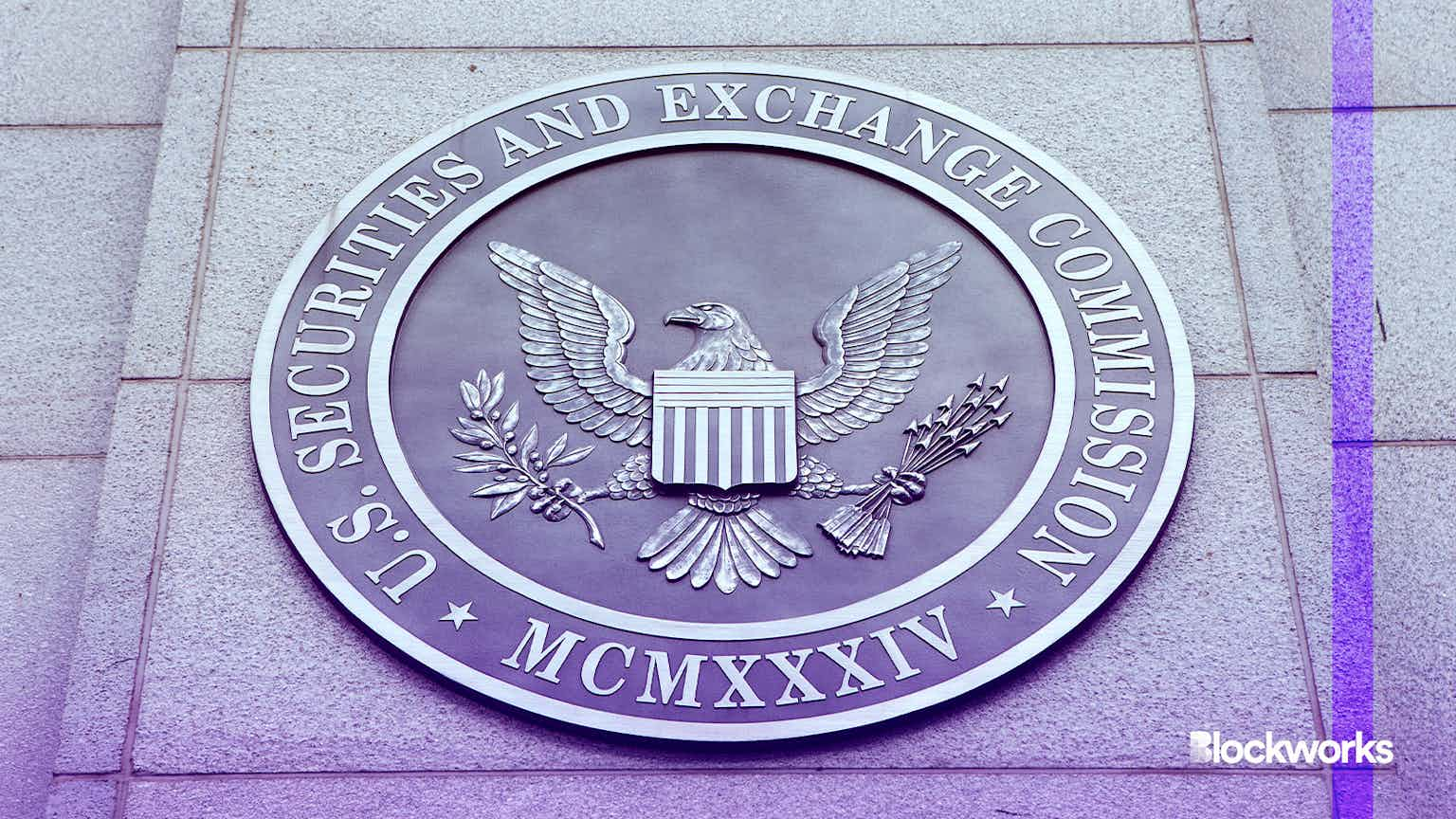Empire Newsletter: Uniswap’s SEC woes drag DeFi below CeFi
In this edition: Analyzing the SEC’s market impact, the 13F ETF tell-all and FTX generating bipartisan unity in Congress

Artwork by Crystal Le
Party pooper in chief
There are concerns over whether the SEC’s targeting of Uniswap Labs will rain on DeFi’s parade heading into the next potential phase of the current bull market.
Gensler’s legal threats may chase innovators offshore and trigger a Web3 brain drain. Or perhaps crypto projects, which may have launched in the US, simply won’t debut at all, for fear of a Wells notice — or worse.
Uniswap Labs CEO Hayden Adams swore to fight any lawsuit that comes its way, but the market has still sharply reacted. UNI — the native crypto of the Uniswap exchange which doubles as a DAO governance token — sank as much as 45% after the notice was disclosed last week and has barely bounced back.
UNI’s losses were enough to pull the DeFi sector below centralized finance (CeFi) in terms of market dominance for the first time in over three years, per data from The Tie.
Each line shows indexed market dominance for different sectors, based on capitalizations of cryptocurrencies related to those segments. CeFi consists of native tokens for exchanges including OKX’s OKB and Bitfinex’s LEO, alongside those for centralized lending platforms like Nexo, and many more.
DeFi is otherwise made up of cryptocurrencies tied to DAOs and protocols including Uniswap, Maker, Athena, and Aave, among others. CeFi is currently about 4.3% of the total crypto market while DeFi represents nearly 3.6%.
Despite their outsized mindshare, memecoins are only 2% of crypto. Memecoins held practically the same dominance in April 2021, as bitcoin neared its first major peak of that year. So, memecoins aren’t exactly bigger today than during the last bull market.
Dogecoin’s lackluster performance against bitcoin is largely to blame for the segment lagging behind. A raft of new memecoins have indeed exploded in value, but that hasn’t been enough to make up for dogecoin’s underperformance.
Other big plays of this cycle — DePIN, real-world assets and decentralized social media — are seeing varied success. DePIN’s dominance has actually been cut by more than half over the past three years, from 1.85% to 0.72%.
But again, a segment leader has dragged the rest down with it, with filecoin (FIL)’s bitcoin ratio collapsing by more than 65% over the past year. Render, which powers the decentralized computing marketplace of the same name, is now practically tied with FIL for largest DePIN cryptocurrency by market cap, after its bitcoin ratio more than doubled in the past year.
SocialFi has meanwhile tripled its market dominance in three years, from 0.03% to 0.09%. Tokens tied to real-world asset platforms like Centrifuge, Goldfinch and Ondo have gained even more, blowing past SocialFi, as well as last cycle’s favorites move-to-earn and fan tokens.
Read more: What is SocialFi? Unpacking crypto’s answer to social media
All this goes to show that finding success in crypto markets isn’t just about picking the next big narratives. It also takes backing the right horses in each race, with age seemingly often working against former front-runners.
The same can’t be said for bitcoin. Its market dominance is near its three-year highs, now 54%, as rival layer-1s lose ground on the whole.
— David Canellis
Data Center
- The total ETH locked in Ethereum mainnet DeFi is up to 16.32 million ETH ($48.62 billion), the most in over a year. SOL in Solana DeFi has so far stayed flat in April.
- Meanwhile, nearly 21,909 validators are queued to join the Ethereum blockchain — a six-month high.
- Base now has more native stablecoins than Avalanche: $2.05 billion to $1.72 billion. Most of it is USDC, after a recent pledge to move Coinbase customer deposits to the network.
- Margin.fi’s bleeding has slowed since its founder quit. It lost one-third of its total SOL stake in the days following, dropping from around 4.4 million SOL to 2.84 million SOL.
- $256.6 million in longs have been liquidated on centralized exchanges in the past 24 hours.
All aboard the ETF train
It’s 13F szn.
The SEC’s 13F form requires institutional investment managers to disclose their holdings quarterly if they manage over $100 million in assets.
Throughout our reporting since January, multiple analysts and experts have highlighted the 13F filing because this batch is our first look at who’s investing in the newly launched funds on an institutional level.
On the other hand, it’s still early for a lot of institutional investors. So we may not see a lot of funds with a lot of assets under management (AUM) disclose holdings in a spot bitcoin ETF…yet.
Valkyrie’s Steven McClurg told Blockworks in February that the firm had spoken to financial advisers and “overwhelmingly, the response is that they’re not ready yet.”
Because the quarter only ended last month, it’s still early for some of these firms to file their 13Fs, and many of the larger positions will likely be reported closer to May. But the early bird gets the worm, right?
So who is already in this space? There are a lot of smaller financial planner offices with exposure to various bitcoin ETFs. One of the first such firms to disclose holdings was Burkett Financial Services, which holds roughly 600 shares of BlackRock’s IBIT.
Read more: Despite bitcoin ETF approval, institutions are on the sidelines: BitGo CEO
Then you have firms like LexAurum, which holds nearly 12,000 shares of IBIT worth roughly $430K at current prices.
Brookstone Capital Management owns 85,000 shares of Fidelity’s bitcoin ETF and roughly 9,000 of Bitwise’s ETF, according to SEC filings.
These numbers may not be flashy or as big as some in crypto want. But they show that institutions are slowly entering the market and, if this trend continues, the appetite for bitcoin ETFs — and potentially other crypto-based ETFs — is poised to grow.
— Katherine Ross
Tax man inbound
Hopefully everybody filed their taxes yesterday, or at least sought an extension. The IRS is betting a lot of crypto players probably didn’t, however.
Guy Ficco, the IRS’s chief investigating officer, said over the weekend that the agency is preparing to battle more crypto tax crimes this year.
2024 may be one of the final years under the current US crypto-tax policy framework. In March, the Department of Treasury released its 2025 revenue proposals, including new ideas on how to cash in on crypto trading and related activities.
The IRS says it’s finally time to bring all digital assets under existing wash trading rules, a change that, if passed, would nix a popular — and oftentimes lucrative — trading strategy already banned in equity markets.
The Department wants to add a 30% excise tax on electricity used for any companies that mine crypto. If the proposal is adopted, miners would be required to report the amount and type of electricity used and the cost, when purchased externally.
Read more: US Treasury once again proposes new crypto tax rules to “modernize” code
Miners that lease equipment would also be responsible for reporting electricity values and firms that use off-grid power would have to pay 30% of estimated costs.
The Biden Administration first proposed excise taxes — along with a slew of other crypto tax rules — on miners last year, citing environmental concerns.
The plans haven’t gotten off the ground yet, so no need to rush to learn any new rules. In the meantime though, there are some things you can do now to make next April 15 a little easier.
Keep a record of everything. If you made a trade (even if it’s crypto to crypto) it’s probably a taxable event, so write it down. Airdrops have a tax burden, too, so don’t forget to record the initial value of whatever you received. There’s no such thing as free money!
— Casey Wagner
The Works
- The Bank of England still hasn’t made up its mind on whether to issue a CBDC, Yahoo Finance writes.
- Franklin Templeton’s crypto team explored Runes, the upcoming token standard built on Bitcoin.
- A group of banks and payment firms are testing tokenized deposits in the UK, according to Bloomberg.
- Microsoft bought a $1.5 billion stake in G42, an AI startup based in the UAE, Reuters reports.
- Sullivan & Cromwell may lose out on a job working with the DOJ on Binance oversight because of the law firm’s work for FTX, per Bloomberg.
The Morning Riff
Leave it to FTX to generate some bipartisan unity in Congress.
Senators Elizabeth Warren, D-Mass., and Chuck Grassley, R-Iowa, are about as far apart politically as two lawmakers in Washington can get.
But when it comes to prying details out of the CFTC on their meetings with disgraced FTX CEO Sam Bankman-Fried, it’s time to link arms.
Specifically, the pair want to know what was said between SBF and agency Chair Rostin Behnam, who reportedly messaged directly with the recently convicted crypto mogul.
Warren (perhaps rightfully) is viewed as an enemy of crypto. But digging into possible coziness between the US government and one of the industry’s most infamous scammers? Sounds good to me.
— Michael McSweeney
Start your day with top crypto insights from David Canellis and Katherine Ross. Subscribe to the Empire newsletter.





